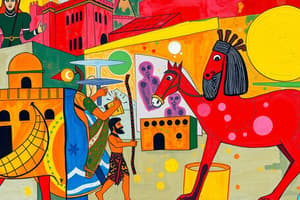Podcast
Questions and Answers
Which ancient civilization is known for its pyramids, mummification, and pharaonic dynasties?
Which ancient civilization is known for its pyramids, mummification, and pharaonic dynasties?
- Ancient Rome
- Mesopotamia
- Ancient Greece
- Ancient Egypt (correct)
Who was the Roman general and statesman who transformed the Roman Republic?
Who was the Roman general and statesman who transformed the Roman Republic?
- Napoleon Bonaparte
- Abraham Lincoln
- Julius Caesar (correct)
- Alexander the Great
What was the primary goal of the Crusades?
What was the primary goal of the Crusades?
- To reclaim the Holy Land from Muslim rule (correct)
- To spread Christianity throughout Europe
- To establish a feudal system in medieval Europe
- To bring about the Renaissance
What was the main outcome of the Industrial Revolution?
What was the main outcome of the Industrial Revolution?
Who was the American president who led the Union during the Civil War and abolished slavery?
Who was the American president who led the Union during the Civil War and abolished slavery?
What period of time is characterized by the revival of classical learning and arts in Europe?
What period of time is characterized by the revival of classical learning and arts in Europe?
What was the main consequence of the Fall of Rome?
What was the main consequence of the Fall of Rome?
Who was the Macedonian king who conquered vast territories?
Who was the Macedonian king who conquered vast territories?
Flashcards are hidden until you start studying
Study Notes
Timeline of Major Historical Events
Ancient Civilizations (3000 BCE - 500 CE)
- Mesopotamia: Sumerians (3500 BCE), Babylonians (1800 BCE), and Assyrians (1000 BCE) developed writing, cities, and empires
- Ancient Egypt (3100 BCE): Pyramids, mummification, and pharaonic dynasties
- Ancient Greece (8th century BCE): City-states, philosophers (Socrates, Plato, Aristotle), and Olympic Games
- Ancient Rome (8th century BCE): Republic, Empire, and Pax Romana
Middle Ages (500 - 1500 CE)
- Fall of Rome (476 CE): Barbarian invasions and decline of Western Roman Empire
- Rise of Christianity: Spread of Christianity throughout Europe
- Feudal System: Lords, vassals, and serfs in medieval Europe
- Crusades (1095 - 1291): Christian campaigns to reclaim Holy Land
Early Modern Period (1500 - 1800 CE)
- Renaissance (14th - 17th century): Revival of classical learning and arts in Europe
- Age of Exploration (15th - 17th century): European discovery and colonization of Americas
- Reformation (16th century): Protestant split from Catholic Church
- Enlightenment (17th - 18th century): Scientific and philosophical advancements
Modern Era (1800 - 2000 CE)
- Industrial Revolution (18th - 19th century): Transition from manual to machine-based production
- World War I (1914 - 1918): Global conflict and rise of nationalism
- World War II (1939 - 1945): Global conflict, Holocaust, and formation of United Nations
- Cold War (1945 - 1991): Ideological and political rivalry between USA and USSR
Notable Historical Figures
- Alexander the Great (356 - 323 BCE): Macedonian king who conquered vast territories
- Julius Caesar (100 - 44 BCE): Roman general and statesman who transformed Roman Republic
- Napoleon Bonaparte (1769 - 1821): French military leader who rose to power and reformed Europe
- Abraham Lincoln (1809 - 1865): American president who led Union during Civil War and abolished slavery
Timeline of Major Historical Events
Ancient Civilizations (3000 BCE - 500 CE)
- Sumerians in Mesopotamia developed writing and cities around 3500 BCE
- Babylonians in Mesopotamia rose to power around 1800 BCE
- Assyrians in Mesopotamia built empires around 1000 BCE
- Ancient Egypt was founded around 3100 BCE, featuring pyramids, mummification, and pharaonic dynasties
- Ancient Greece consisted of city-states, featured philosophers like Socrates, Plato, and Aristotle, and hosted the Olympic Games from the 8th century BCE
- Ancient Rome was established in the 8th century BCE, transitioning from a Republic to an Empire and achieving Pax Romana
Middle Ages (500 - 1500 CE)
- The Western Roman Empire fell in 476 CE due to barbarian invasions, leading to decline
- Christianity spread throughout Europe during this period
- The feudal system emerged in medieval Europe, consisting of lords, vassals, and serfs
- The Crusades took place from 1095 to 1291, involving Christian campaigns to reclaim the Holy Land
Early Modern Period (1500 - 1800 CE)
- The Renaissance saw a revival of classical learning and arts in Europe from the 14th to 17th century
- The Age of Exploration occurred from the 15th to 17th century, marked by European discovery and colonization of the Americas
- The Reformation in the 16th century led to a Protestant split from the Catholic Church
- The Enlightenment from the 17th to 18th century was characterized by scientific and philosophical advancements
Modern Era (1800 - 2000 CE)
- The Industrial Revolution transformed production from manual to machine-based from the 18th to 19th century
- World War I took place from 1914 to 1918, marked by global conflict and rising nationalism
- World War II occurred from 1939 to 1945, featuring global conflict, the Holocaust, and the formation of the United Nations
- The Cold War was an ideological and political rivalry between the USA and USSR from 1945 to 1991
Notable Historical Figures
- Alexander the Great, a Macedonian king, conquered vast territories from 356 to 323 BCE
- Julius Caesar, a Roman general and statesman, transformed the Roman Republic from 100 to 44 BCE
- Napoleon Bonaparte, a French military leader, rose to power and reformed Europe from 1769 to 1821
- Abraham Lincoln, an American president, led the Union during the Civil War and abolished slavery from 1809 to 1865
Studying That Suits You
Use AI to generate personalized quizzes and flashcards to suit your learning preferences.




